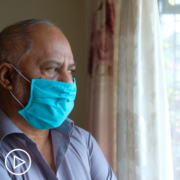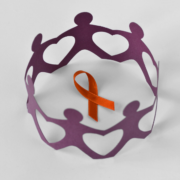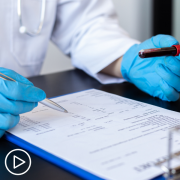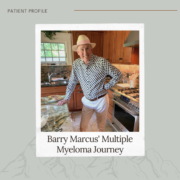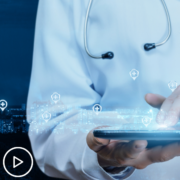CLL & COVID 19: What Do Patients Need to Know?
CLL & COVID 19: What Do Patients Need to Know? from Patient Empowerment Network on Vimeo.
See More From The Pro-Active CLL Patient Toolkit
Related Resources

|

PEN-Powered Activity Guide: Utilizing Telemedicine Tools & Staying Connected |

|
Transcript:
Dr. Steven Coutre:
Well, of course, we are in the COVID era. We don’t know how long this is going to last. And so, a very common questions that comes up from our patients with CLL is what impact does this have on them and are they more susceptible, you know, the natural things that people wanna know. With CLL in general, there probably is some compromise to the immune system, but it’s really hard to measure or quantify. Certainly, individuals who’ve had a lot of chemotherapy in the past, who have advanced disease are more susceptible to infections. In contrast, someone who’s without symptoms, has a low burden of disease probably is close to being like somebody who doesn’t have CLL. So, there’s certainly a spectrum.
Really, we just try to advise following the guidelines that we are all following in terms of social distancing at present, at being aware of being around others too closely, or those who may have symptoms. So, I think, in a way, what everyone is doing now is something that is beneficial to patients with CLL, and certainly other cancers, with respect to infection risk.
Now, what about do we have any information? Is somebody with CLL more susceptible to getting COVID? What if you do get the infection? Is it going to be more severe because you have underlying CLL? And, at least in general terms, the answer seems to be no. That’s really just based on experience, anecdotal experience, certainly in areas like New York City or Italy, for example, where infectious rates have been quite high. Colleagues have commented that their patients don’t seem to be more ill simply because they have the underlying disease or because they’re on a certain treatment, for example.
There’s actually some very interesting data suggesting that perhaps the BTK inhibitors, Ibrutinib, Acalabrutinib, et cetera, might actually confer benefit, might lessen some of the consequences of the infection, and as a result, large clinical trials have started for patients without CLL. Just anyone who has a significant COVID infection who’s hospitalized, they’re testing that hypothesis. So, it’ll be very interesting to see what we learn from this. Perhaps what we’ll learn is that being on a drug like that might actually be beneficial.
It’s certainly natural to be hesitant to come into a healthcare facility because of the risk of infection, and certainly that’s gonna vary quite a bit depending on where you are. At the height of the pandemic in New York City, of course, a lot of concern on the part of patients going into a hospital clinic, for example. Whereas, at our institution, the impact has been quite low. All institutions, of course, have taken any precautions they can to limit exposure, so, I’ve often told my patients that it’s probably safer to come into our clinic and get your blood drawn or see someone if you need to than going to the grocery store, for example, in terms of exposure.
But that’s very different than saying the same thing in the middle of New York City. So, I think you have to deal with each situation as it arises, and one would hope that your physician can give you guidance. And I think, in particular, what we can do is really decide how important it is to see somebody in person or have them come in and get a lab test there. I think in many, many, many cases, that can be avoided for the time being.
And that also is an important point, that we can provide reassurance that you know, you’re used to coming in every four months or every six months and having things checked, and in many cases we can reassure that individual that it’s okay to wait. It’s not critical to get that information right now.
So, remember that what we often emphasize in evaluating someone and making decisions when to treat is three things. It’s how you feel, what your exam is like, and what your blood counts look like. So, of course, you know how you feel. If something changed, you’re having night sweats, or a lot more fatigue, is it significantly different? Of course, you typically know if anything’s changing with your exam. Are your lymph nodes getting enlarged?
Do you notice discomfort in your abdomen because of an enlarging spleen?
And so, two of the three things you can sort of self-assess, in a way, and then based on what your blood counts have been showing over time, your physician can factor that in and decide how important it is to get that test now. And as I mentioned, in many, many cases, it’s perfectly fine to delay that. So, it’s not as difficult as it might seem to you to be able to come up with a reasonable assessment about how somebody might be doing, even in the absence of seeing them and doing an exam in person.

